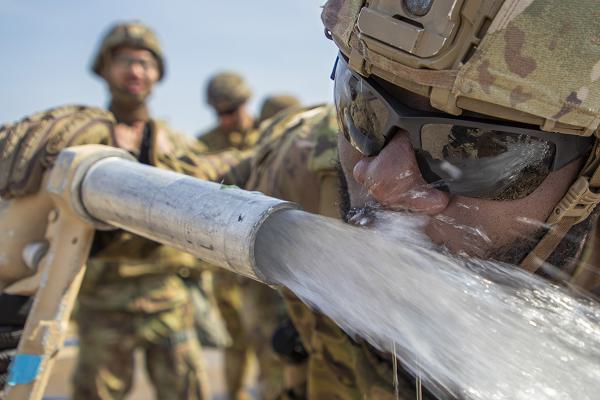
Paju-si, South Korea. (March 15, 2025): Water, water, everywhere but not a drop to drink. Troops in the field can go without a lot of things, sleep, food, and rest, but the one thing they can’t do without is water. In this photo by Staff Sergeant Neil McLean, Staff Sergeant Rickel May tastes fresh water after completing water purification operations to ensure a safe and adequate supply for the troops.
SSG May and his team are fighting one of the deadliest enemies on the battlefield… thirst. Experts tell us that a warfighter in good physical condition can last up to three days without water. That is not a long time. This is why the military deploys teams of Water Treatment Specialists who are experts in filtration, disinfection, and reverse osmosis to produce safe drinking water regardless of the operational environment.
Dehydration can be deadly. When in need of water, the body signals it is losing fluids which activates the part of the brain that triggers thirst. Physical symptoms begin with a dry mouth and throat, headaches, fatigue, and a full-body sense of weakness. Next, victims experience dizziness and lightheadedness due to a sudden drop in blood pressure. Continued lack of water causes the body to release hormones designed to help retain fluids and regulate blood pressure. Advanced dehydration can damage the cardiovascular system and the kidneys which can be life threatening.
To prevent this, Water Treatment Specialists begin by using various filters (sand or activated carbon) to remove large particles and heavy metals. Next, the water is disinfected using common household chemicals, like chlorine bleach, that kills any viruses or bacteria present. Other tools to kill germs include using ultra-violet light and iodine tablets in emergency situations. Finally, technicians will use Reverse Osmosis, a process of filtering water through semi-permeable membranes, to extract fine impurities and contaminants.
Water Treatment Specialists undergo twelve weeks of hands-on training at Fort Gregg-Adams, Virginia, where they study water quality analysis and equipment operation. Students learn how to install and operate water purification systems and how to ensure clean water is stored properly. They also continuously perform chemicals testing and inspect facilities and food supplies for potential hazards to the health of the troops.
America’s troops can get along without many things, but not clean, readily available water to drink.


